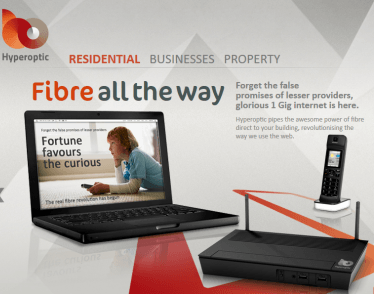
Rogers Cable lets their customers purchase this cable box outright to avoid rental charges.
Stephen Simonin first came to our attention in January 2010 when he proposed charging cable operators room and board for their expensive cable set top boxes they require subscribers to rent. Now, the chairman of the Litchfield (Conn.) Cable Advisory Council is back with another salvo — demanding an end to mandatory rental charges for cable TV equipment and access to competing providers:
The biggest industry in the US that has money for jobs is the entertainment industry. Federal law requires Cable to carry local broadcast and public channels in the clear for all. If we contact our Federal representatives and ask them to add: “Must carry adjacent competitors programming” We would add a million USA jobs immediately. Paid for by corporate cable and NOT tax dollars!
Cable has forced all of us to RENT cable boxes. We are not allowed to buy them because this is guaranteed free revenue forever for them. A box costs less than $100 and we pay nearly $10 a month for rental and power each month. Cablevision makes over $1,000,000,000 a year on set top box rentals alone. This is only one company! They have compressed TV to less than 20% of the transport. They use the other 80% for business and not covered under TV franchise (Wi-Fi, data, phone business). However, they use the TV franchise for this monopoly access to our front doors.
Adding this must carry clause will allow up to 5 different cable providers at our front doors for lower costs, higher quality and real competition. Cable will not want to give up that fat 80% business revenue they have today and will need to add a new fiber/co-ax transport across the country on their nickel! Think how many local jobs $1,000,000,000 can pay for. Now remember that we have several cable companies here in CT!
These are American jobs! Please help us get this passed! Call our Federal Congressman and Senators today. Remind them of the details I have sent them on behalf of the People.
Simonin’s proposal, sent to Stop the Cap!, enjoys some precedent… in Canada.

Sky Angel, a Christian television distributor, abandoned satellite in favor of IPTV several years ago. Their subscribers watch Sky Angel's channel lineup over a broadband connection.
Consumers there can purchase cable boxes in stores like Best Buy ranging from $80 for a refurbished unit that works with Shaw Cable to $500 for a cable box with DVR designed for Rogers Cable customers. Buying your own box puts an end to rental fees, often $7+ per month, which never stop, even after the box is effectively paid for in full. But for those seeking a built-in DVR, the initial price tag is on the steep side. The practice of buying boxes has also generated some surprising competition between Rogers and itself. When customers call to inquire about new service, Rogers often includes discounts including free box rentals, making it unnecessary to purchase the box at all (as long as you remember to re-negotiate an extension of the promotion when it ends). That’s a savings of nearly $100 a year for some customers. Buying DVR equipment guaranteed to work with your current provider also makes it easy to upgrade the device with larger capacity hard drives that can store more programming. Since the failure point for most DVR’s is the hard drive, occasional replacements and upgrades can keep a box running for years. Many pay providers in the United States charge higher rental prices for higher capacity equipment, with no option to buy.
Simonin’s proposal to open up cable networks to other providers is more novel, and probably a lawyer’s dream come true for the endless litigation it offers. It’s highly unlikely the courts will side with the notion of forcing cable operators to open their infrastructure to competing providers, and considering the amount of informal collusion between companies today, it’s probably not going to deliver much savings.
A bigger hope on the horizon is the ongoing march to IPTV — television programming delivered using Internet technology. With strong Net Neutrality policies in place (and a strong position against Internet Overcharging with usage caps or usage-based billing), dozens of new virtual “cable companies” could be launched, delivering their lineups over the Internet, direct to computer and television screens. That could deliver consumers an endless choice of providers, assuming regulatory oversight is in place to make sure programming is available to all at fair and reasonable prices and that broadband providers are not allowed to block or impede access to the offerings that result.
It’s much easier to do an end run around Big Cable than trying to find a way to get them to change their business plans.
 While British Telecom and Virgin rely on partial fiber networks to deliver faster broadband, they can’t touch the speeds on offer from Hyperoptic, a new start-up fiber t0 the home provider competing for broadband customers in London. For just under $80 a month, customers can purchase the UK’s first 1Gbps broadband offering, which lets you download an HD movie in about 40 seconds.
While British Telecom and Virgin rely on partial fiber networks to deliver faster broadband, they can’t touch the speeds on offer from Hyperoptic, a new start-up fiber t0 the home provider competing for broadband customers in London. For just under $80 a month, customers can purchase the UK’s first 1Gbps broadband offering, which lets you download an HD movie in about 40 seconds.

 Subscribe
Subscribe




